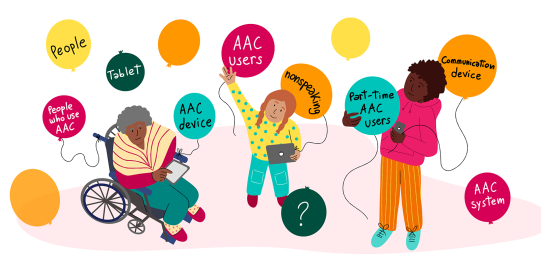In early 2022, AssistiveWare ran an online survey, asking people with a variety of relationships to AAC what they thought about 119 different words and phrases. The first research of its kind, our survey resonated deeply with the community—in total, 556 people participated.
We reached out through many channels to ensure the survey respondents represented the community at large. AAC users, their families, and AAC professionals are all represented among our participants — including people with multiple relationships to AAC!
We picked the terms in the survey based on the language we saw in AAC-focused social media groups, advocacy organizations, and academic publications.
In our last blog post about the survey, we shared the perspectives of AAC users. Now, considering the preferences of people who use AAC, their relatives, and AAC professionals, we can share our overall recommendations.
Overview of our recommendations
|
|
||
|
|
||
|
|
||
|
|
||
|
|
||
|
|
||
|
|
||
speaking |
Download an AAC terminology poster to use at home or in the classroom
Some people have multiple relationships to AAC. AAC users can get into AAC research like we did. Siblings can become SLPs, and teachers can discover that their own kids need the same tools they work with every day at school. In this blog post, we consider people with just one role. If you see a number that doesn’t quite match the last post — that’s not an error! Some numbers change slightly when we pull out the AAC users with multiple roles.
We asked participants about their relationships to AAC; survey response options included “I use AAC” and “I use both AAC and speech.” Most survey respondents who use AAC also use speech. Sometimes, AAC users have different opinions depending on whether or not they also speak, so we occasionally write about speaking AAC users and nonspeaking AAC users separately.
About people who use AAC
We recommend both AAC users and people who use AAC. Regardless of people’s relationships to AAC, a majority liked or used both the person-first (people who use AAC; 71%) and identity-first (AAC users; 78%) construction.
Despite the popularity of people who use AAC, we don’t suggest the acronym PWUAAC — it’s the most frequently unfamiliar term in the survey (46%).
We don’t suggest talking about people who rely on AAC or people who require AAC. The connotation of using something versus requiring it or relying on it makes a big difference in perception!
Other options depend on the context — they sometimes fit, but not always.
Part-time AAC users is primarily favored by speaking AAC users, unless they are also AAC professionals.
An educator says:
“I don’t think it’s necessary to differentiate part time vs full time, we all use alternative forms of communication sometimes”
A speaking AAC user explains:
“I don't like the differentiation between part- and full-time AAC users because people often think that we part-time users don’t "really need" AAC, which is not the case. But sometimes, the differentiation seems needed? I often say, "I use a combination of speech and electronic speech/AAC to communicate”
An attorney who specializes in funding for AAC devices notes:
“My professional focus is funding and none of these phrases helps. A funding source once stated that a SGD will be covered only for someone who can demonstrate the device will be the sole method of expression. That 'demand' was dropped when it was made clear that no one fits that description, with or without disability. So, 'part-time' and 'full-time' is not helpful.”
People with complex communication needs and multimodal communicators are both primarily favored by AAC professionals (76%-78%) and relatives of AAC users (58%-61%). AAC users aren’t as likely to favor these terms overall, but these terms have their time and place. People with complex communication needs may be fine to refer to people who use AAC but not spoken language — almost half of them like or use the term (43%). Multimodal communicators, on the other hand, may be a better option for speaking AAC users: a small majority like or use the term (52%).
We don’t recommend shortening people with complex communication needs with acronyms. A majority of respondents either dislike or are unfamiliar with the terms people with CCN (54%) and PWCCN (77%).
Not patients, consumers, or support recipients: we’re just people
When we don’t need to specify further, it’s best to simply say people. Everyone who took the survey understands it, and it’s the least disliked term in the whole survey (<1%).
When we do need to specify further, describing the relevant people is a good choice — people who use AAC is an example of this.
We don’t suggest referring to people as patients, consumers, or support recipients outside very specific settings: regardless of people’s relationships to AAC, these terms are commonly disliked (56% to 83%) and rarely liked or used.
Many people who took the survey made comments similar to this one from a speaking AAC user:
“Some are very context-specific. Patients- only in a medical setting. Clients- only in a setting where they are clients. Friends- only if they are actually friends. Learners- only in an educational setting or a context pertaining to them learning. Communicators- everyone communicates.”
The main problem with the words individuals and users is that they’re not the word people. They’re both well-liked and used across all groups, but people is strictly more popular. So, don’t worry too much when these terms make sense to use, but do ask yourself if people works instead.
What should we call the device?
We suggest talking about AAC devices or simply devices when relevant. Referring to the hardware, like an iPad or a tablet, is also a good option when you know what the hardware is.
We recommend against talking about talkers in the general sense — when externally imposed, talker may be taken as too childish. Disabled children notice quickly when they’re treated as younger than their abled peers, and adults definitely notice when they’re considered childish!
Some AAC professionals note that they would only use talker with young children:
“this depends on age and context.. it’s a slap in the face for my clients with MND [Motor Neuron Disease] to call their device a talker…..”
“I think talker may be appropriate for a young child but not for older young people or adults”
“It depends on the child, but I have had children as young as 7 say they preferred “device” rather than “talker” because “talker” was too babyish”
A parent who uses talker explains:
“I struggle with what to refer to my kids aac device as. We settled on “talker” mostly to differentiate it from his gaming iPad.”
Referring to AAC systems and AAC tools is fine — we don’t suggest going to any great effort to avoid these terms. However, much like with individuals versus people, we do suggest asking yourself if device would work instead.
Speech-generating device (SGD) may sometimes be necessary terminology to get a device funded. However, it’s not an especially popular term, and we don’t recommend it outside that context. As with the prior acronyms, SGD is less popular and more unfamiliar than speech-generating device.
Both Voice output communication aid and its acronym, VOCA, are less popular than speech-generating device and SGD. Some participants commented that VOCA was an outdated term.
How do we talk about not talking?
We usually suggest nonspeaking over nonverbal: it’s the more popular term overall (51% vs. 36%) and strongly preferred by neurodivergent AAC users.
However, it is worth noting that people who use AAC and don’t identify as neurodivergent are more likely to prefer nonverbal.
Functionally nonverbal, preverbal, and prevocal should simply be avoided in an AAC context.
Someone with a family member who uses AAC explains:
“I only like "preverbal" or "prevocal" when they refer generally to an infant early developmental stage. Beyond early infancy, pre indicates that you are trying to predict the future in the direction you want the future to go in. I'm not so comfortable with that. Maybe I feel it is insulting in that it tells us the person feels being verbal and vocal are better or that their child is not like some of our children in that they are only pre/temporarily such.”
A friend of an AAC user notes:
“I use “preverbal” for young children, who are not yet speaking but are likely to do so in the future. I consider it highly inappropriate when applied to older children or adults.”
Disability, disorder, deficit, or impairment?
When possible, we suggest disability terms, like communication disability or speech disability. There isn’t a full consensus here, but fewer AAC users dislike disability terms (13%) than similar terms using difference (42%), disorder (46%), deficit (78%), or impairment (48%).
Deficit is the option we most strongly recommend against. It’s widely disliked across a variety of relationships to AAC (61-92%).
Disorder terms aren’t ideal — they’re more likely to be disliked than disability terms. But speech disorder isn’t as widely unpopular as speech deficit or communication deficit.
Talking about talking
We suggest either spoken language or spoken words; They’re the most liked and used options to discuss spoken language.
Natural speech and natural language should be avoided in an AAC context. One AAC user who also works with AAC as an educator notes,
“I don't like "natural speech" because it seems to imply other communication is unnatural.”
Language and speech apply to more than just the words we speak orally — if you want to be more specific, these aren’t the best choices. However, these terms are fine in their broader meanings.
Mouth words is community-specific: neurodivergent AAC users like and use mouth words, but no other groups do. Most negative comments about mouth words come down to it simply feeling strange. Sometimes people dislike words just for how they make you feel - like ‘moist'!
One respondent outside the AAC field explains:
“I think I just don't like the word mouth. Not for any reason but that thinking about the bodily orifice makes me uncomfy”
However, a neurodivergent educator finds the term useful:
“Mouth words had been so helpful to be really specific and clear about exactly what I’m talking about, no ambiguity.”
Communication supports
We suggest referring to Communication supports and AAC supports — these terms are broadly accepted. AAC strategies isn’t quite as popular, but it’s fine when the strategies, in particular, are a key part of the conversation.
However, we suggest avoiding AAC interventions whenever possible: intervention has rather different connotations for people who use AAC (57% dislike) than it does for professionals (51% like or use). If you need to talk about the education or instruction around teaching someone to use AAC tools, consider using the same kinds of words you’d use to describe teaching something new to a fully speaking person without disabilities. You wouldn’t use “intervention” in that context either!
Intermittent, minimal, or unreliable?
There isn’t a strong consensus about how to describe the reasons people might be able to speak — whether they use spoken language to communicate regularly, can technically say a few words, or have any other experience with speaking — and use AAC.
Whenever possible, we suggest following the lead of the person you’re talking about. Some may prefer to simply say they are nonspeaking or nonverbal.
When an AAC user’s ability to speak matters, we suggest one of intermittently speaking, intermittently nonspeaking, or minimally speaking. None of these are particularly popular, but they are less unpopular among the people they might describe.
Acronyms (other than AAC itself)
Whenever possible, we strongly suggest writing terms other than AAC out fully rather than shortening them to create acronyms. Whenever we asked about them, acronyms are less liked and used, more disliked, and more likely to be unfamiliar than their fully written out forms. The most extreme example of this compares people who use AAC, a highly popular term overall, with PWUAAC, the least understood term in the whole survey.
The difficulties understanding acronyms are extreme enough that on devices that support automatic replacements, it may be worthwhile to add text replacements that expand acronyms into their fully written out forms.






